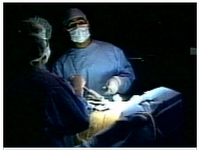Gastric bypass surgery malpractice: Fatal malpractice at NY hpspital unreported

Coney Island, NY
On July 17, 2006, Robert Asta had gastric bypass surgery at Coney Island Hospital. Six days later, the 54-year-old cook was dead.
Internal hospital records reveal a "foreign object" was left inside his body postsurgery, but for the year 2006, Coney Island Hospital reported zero cases in which a foreign object was mistakenly left in a patient after surgery.
Robert's son, Michael, was devastated. It was a surgery Michael didn't want him to have, but Asta desperately wanted to lose weight. The 6-foot, 375-pounder had tried all kinds of diets with little success.
"My life has never been the same. We were supposed to go into business together," Michael Asta said. "My family is heartbroken."
Asta never told his family what he was planning.
"None of us would have let him go," Michael Asta said.
The son said his father told him about the surgery a day after the operation — and said he was in a great deal of pain.
Robert called the hospital, but was told that pain after such an operation is a normal part of the recovery process.
Then on July 20, Asta received a call from the hospital asking him to come in for some further testing after lab tests came back with abnormal results.
The hospital found a piece of surgical tubing in material removed from Asta's body — an indication something had been left inside Asta postsurgery.
A CT scan was taken and the results were inconclusive. On July 23, Michael Asta received a call from his father's long-time girlfriend.
"She told me to come over because, she said, 'He feels very cold and I think he's dead,'" Asta said. When Asta arrived, his father was dead.
In response to the News' questions, the city Health & Hospitals Corp. insisted it didn't need to report this incident as "foreign object left in body" – a specific reporting category. Instead it was reported merely as "unexpected death."
HHC said surgical tubing was not left inside Asta, but an internal Coney Island Hospital document dated Aug. 22, 2006, that the family obtained in its lawsuit states, "Foreign Object left in body during surgical operation."
The autopsy report lists the cause of the death as a postoperative infection in the abdominal cavity that involved "retention of surgical tubing" in a surgical specimen.
Manner of death is listed as "therapeutic complication." Though the hospital didn't admit wrongdoing, the family's malpractice claim was settled for $675,000.
Asta left behind three adult children and two grandchildren.
Labels: gastric bypass malpractice lawsuits, gastric bypass surgery malpractice, patient stories




